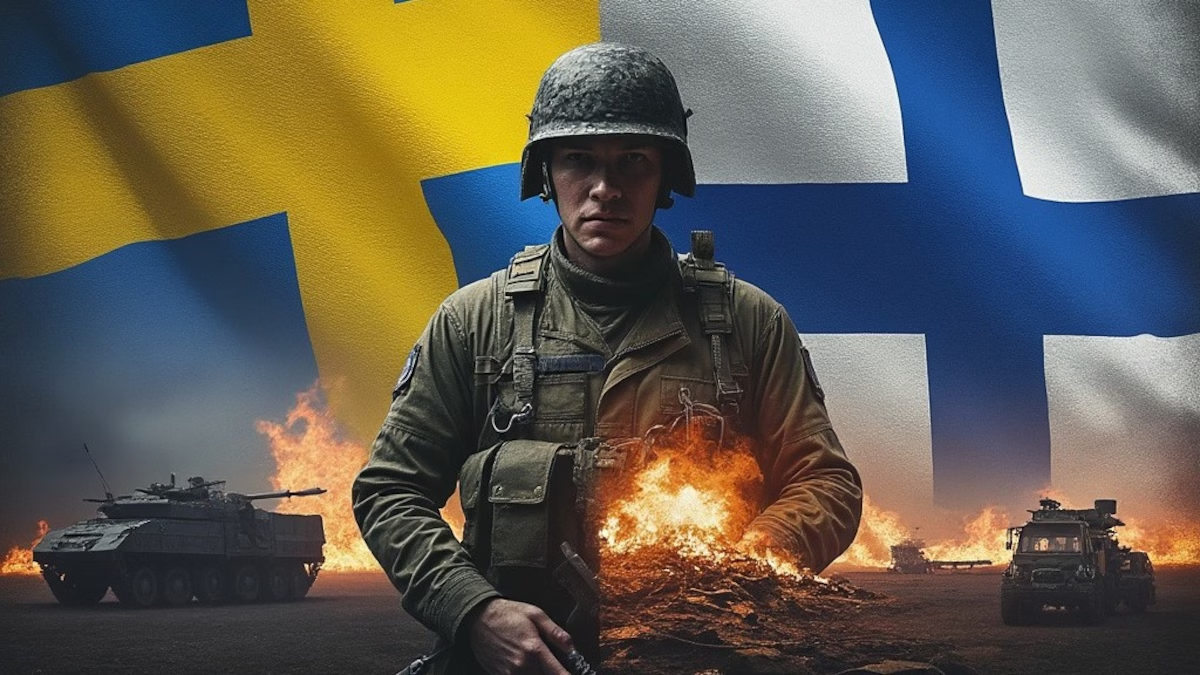As the Russia-Ukraine conflict crosses its 1,000th day, Europe braces for an uncertain future. Several countries, particularly Sweden, Finland, Norway, and Denmark, are ramping up efforts to prepare their citizens for potential crises, ranging from armed conflict to natural disasters. These Nordic nations are taking proactive measures to ensure their people are equipped for self-sufficiency and survival.
Sweden’s Revived Focus on Crisis Preparedness
Sweden has a historical precedent for preparing its citizens for emergencies, but the current geopolitical climate has intensified these efforts. Recently, Sweden distributed millions of copies of a 32-page pamphlet titled “If Crisis or War Comes”.
This document, an updated version of a guide first issued during World War II, is aimed at equipping citizens with the knowledge needed to face various emergencies, including war, natural disasters, and cyber or terror attacks.
The pamphlet advises Swedes to stockpile non-perishable food, water, and essential medicines, and it encourages growing fruits and vegetables in personal gardens. It also emphasizes the importance of keeping cash on hand in case of banking disruptions. The underlying message is clear: Sweden must be prepared for worst-case scenarios, such as an armed attack.
Read : World War 3? Sweden, Finland Urge Citizens to Get Ready for War
The guide asserts Sweden’s commitment to resistance, stating, “If Sweden is attacked by another country, we will never give up. All information to the effect that resistance is to cease is false.” While the pamphlet avoids directly naming Russia, the timing and language strongly imply a response to heightened tensions with Moscow.
Read : Land Sold for Just 1 Krona Per Square Meter in Götene Town of Sweden
Sweden’s initiative reflects a growing awareness of vulnerabilities in the modern era, from cyber threats to hybrid warfare. These concerns have only been amplified since Sweden abandoned decades of military non-alignment to join NATO in response to Russia’s invasion of Ukraine.
Finland’s High Alert and Border Security
Finland, which shares a 1,340-kilometre border with Russia, has historically maintained a heightened level of preparedness. The country has launched an informative website to educate citizens on handling various crises, from natural disasters to military threats. The website underscores Finland’s readiness for self-defense and includes practical checklists for emergencies, such as easy-to-cook food and backup power supplies.

After Russia’s invasion of Ukraine, Finland took the significant step of fortifying its borders. It announced plans for a 200-kilometre border fence with Russia, designed to enhance national security. Scheduled for completion by 2026, the 10-foot-tall structure topped with barbed wire symbolizes Finland’s proactive stance.
Finland’s preparedness goes beyond physical infrastructure. Authorities have consistently encouraged citizens to stock essential supplies and stay informed about crisis management. Finland’s recent accession to NATO further bolsters its defense capabilities, aligning it more closely with other Western nations.
Norway and Denmark’s Preparedness Campaigns
Norway, a founding member of NATO, has taken a comprehensive approach to preparing its citizens. The Norwegian Directorate for Civil Protection (DSB) recently distributed 2.2 million paper copies of a preparedness guide, one for every household. This guide advises Norwegians to sustain themselves for at least a week in case of war or other emergencies.
The checklist includes basic necessities such as tins of beans, pasta, energy bars, and medicines, including iodine tablets for nuclear emergencies. Norway’s initiative highlights the importance of personal responsibility in crisis management, emphasizing that individuals must be ready to manage on their own if state resources are stretched thin.

Similarly, Denmark has advised its citizens to prepare for three days of self-sufficiency. The Danish emergency management agency has provided guidance on essential items, including food, water, and medical supplies, to help individuals navigate crises. While the timeframe is shorter than Norway’s recommendation, the underlying principle remains the same: readiness is key.
Rising Tensions and NATO’s Strengthening
The heightened sense of urgency among Nordic countries is partly driven by recent developments in the Russia-Ukraine war. On the global stage, tensions are escalating, with Russia easing its rules for nuclear strikes and the U.S. allowing Ukraine to use long-range missiles against Russian targets. These actions have raised the specter of broader conflict, pushing European nations to bolster their defenses.
NATO, too, is undergoing significant transformation. Twenty-three of its 32 members have now committed to spending at least two percent of their GDP on defense—a stark contrast to just three countries meeting this target a decade ago. This shift reflects a growing consensus that Europe must be prepared to stand on its own, especially given the unpredictability of global alliances.

Sweden, Finland, Norway, and Denmark’s proactive measures are emblematic of this new reality. These countries are not just preparing for hypothetical scenarios; they are responding to tangible threats that demand immediate action. Their efforts serve as a blueprint for resilience, emphasizing the importance of preparedness in an increasingly volatile world.
A New Era of Civil Preparedness
The initiatives in Sweden, Finland, Norway, and Denmark signal a broader trend towards civil preparedness in Europe. These countries are ensuring that their citizens are not only aware of potential threats but also equipped to face them independently. By fostering a culture of resilience, they are laying the groundwork for collective security and self-reliance.
As the Russia-Ukraine conflict continues to evolve, the importance of readiness cannot be overstated. The lessons learned from these Nordic nations may well shape global strategies for managing crises in the future, highlighting the critical role of citizen engagement in national defense.

